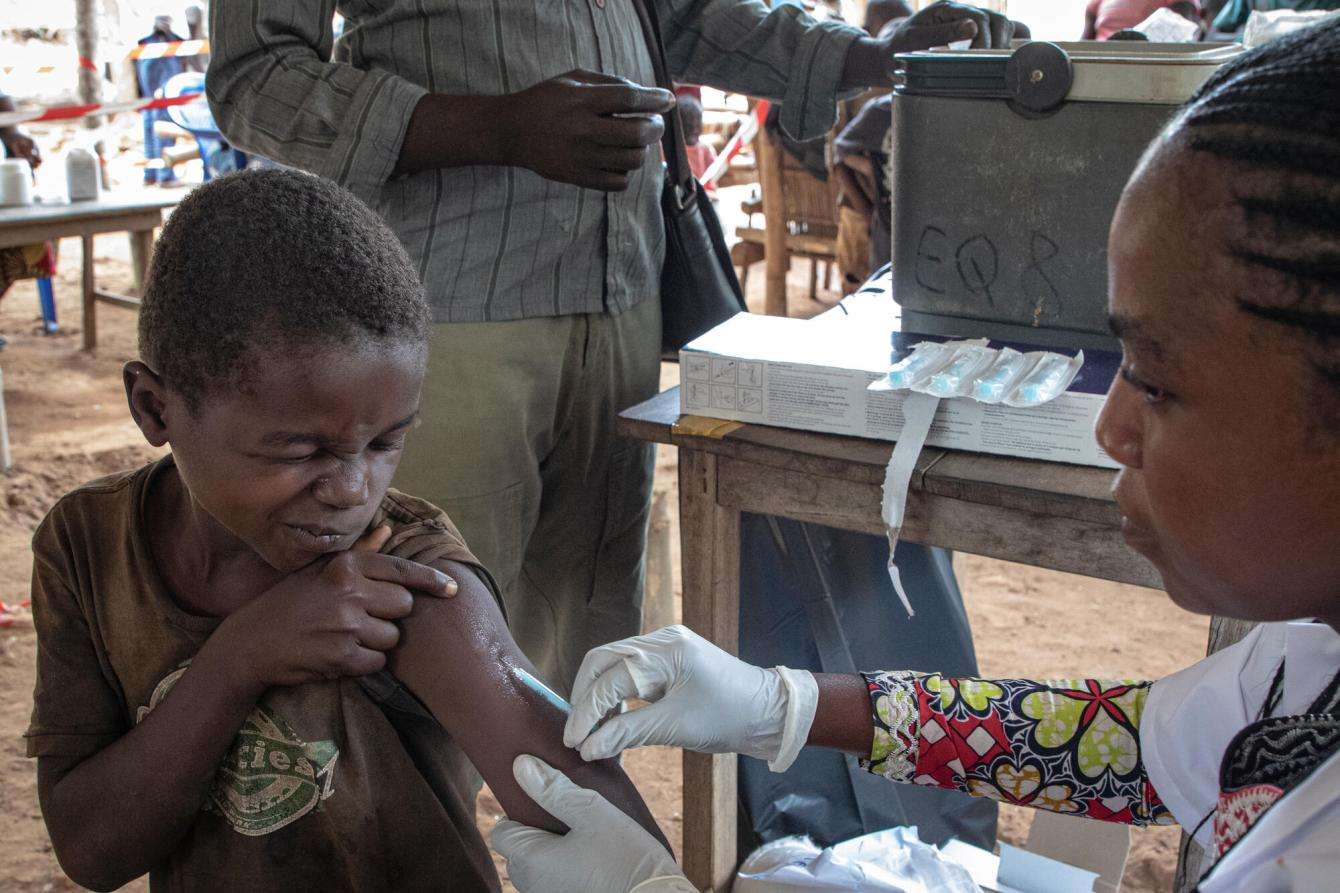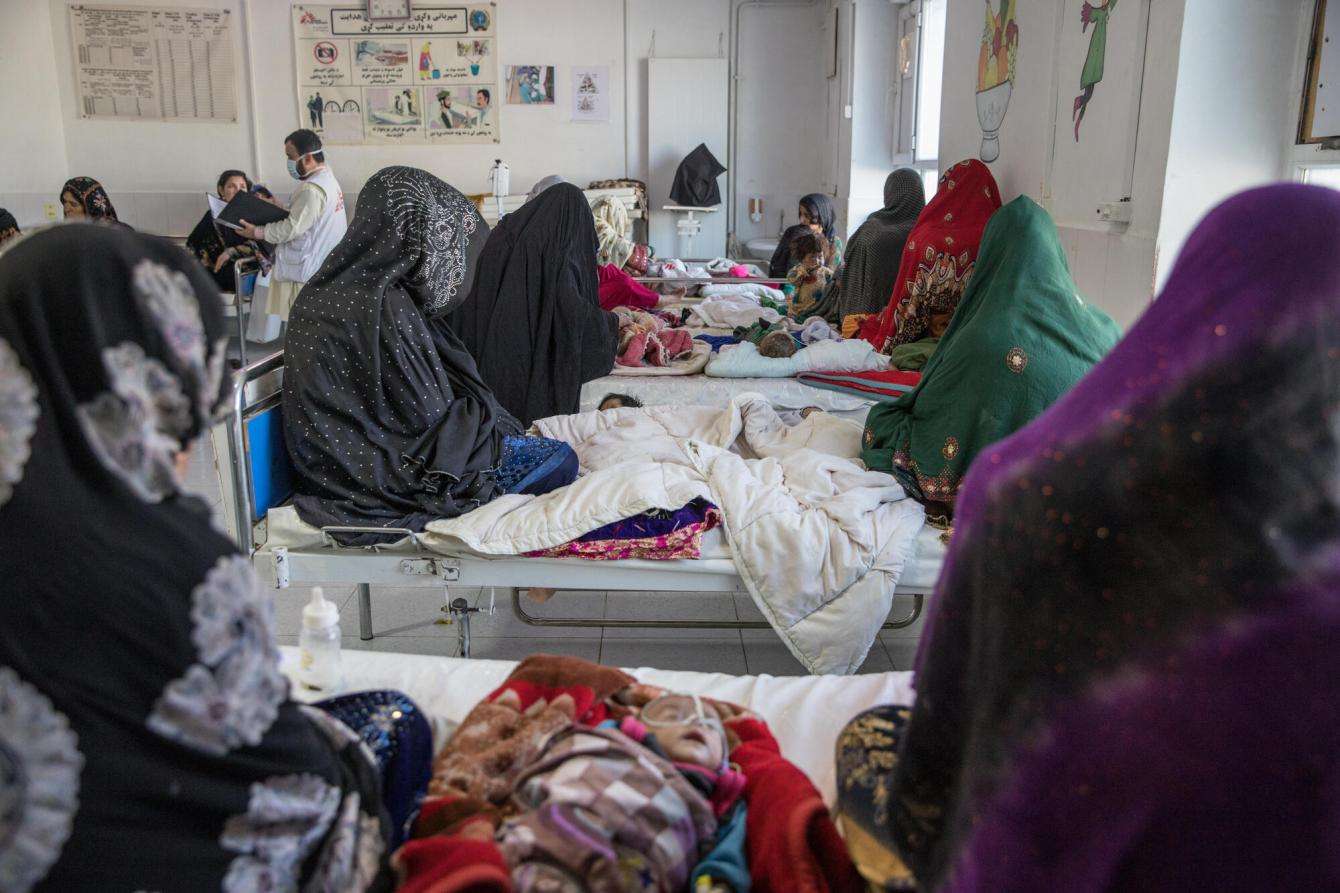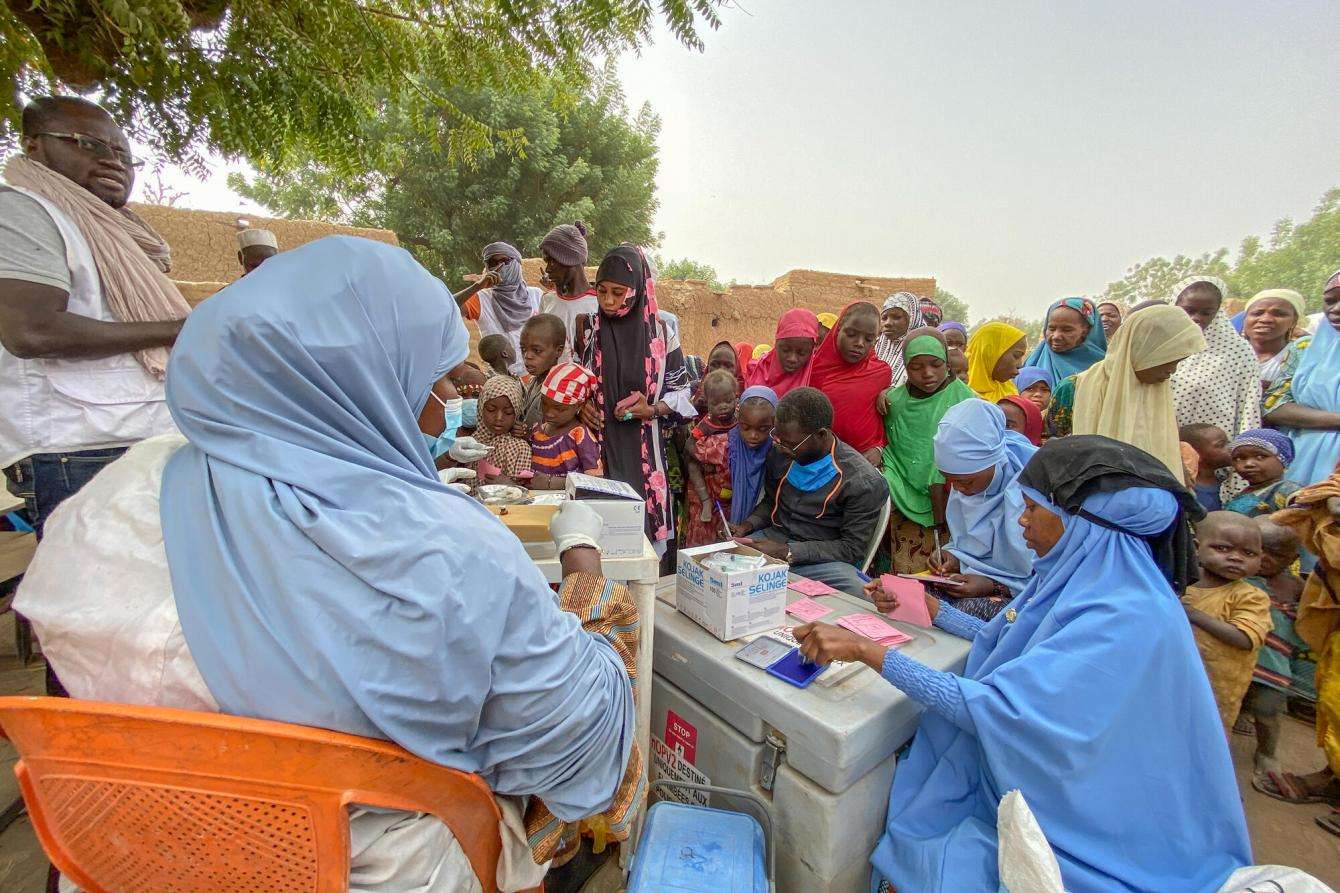Measles is so contagious that a single case in close living conditions like refugee camps can activate an outbreak response. That’s expected to happen more often than usual this year.
The World Health Organization (WHO) found that there were 23 million more babies under one year old who missed their routine vaccinations in 2020 than in 2019—including the first of two measles vaccine doses that are recommended for children by the WHO. That number hasn’t been this high since 2009 and is thought to have contributed to the current massive spike in cases worldwide.
There are various reasons for this; in places like Afghanistan, cases are high partly due to conflict and damaged health infrastructure. In the Democratic Republic of Congo (DRC), inequitable access to preventive and basic health care services has fueled a cycle of measles outbreaks over the years. Some countries—Liberia, for example—may be feeling the direct effects of COVID-19's interruption of routine childhood vaccination campaigns.
Medical staff with Doctors Without Borders/Médecins Sans Frontières (MSF) are already seeing the effects of millions of more sick kids in countries across the globe. Children are especially vulnerable to contracting and dying from measles. “It’s kind of unprecedented that you have this many countries in outbreak this early in the year," said John Johnson, MSF medical vaccination referent for epidemic response.
The path forward is clear: Get vaccines into the arms of children who remain unprotected.
Since 2006, MSF has vaccinated nearly 26 million children against measles, which typically causes severe cold-like symptoms but can have serious and even fatal complications. This year, MSF teams will continue their work to prevent and respond to measles outbreaks with reactive and proactive vaccinations and treatment. There are no specific medications to treat measles, but there are drugs that can keep patients stable and prevent some of the disease’s related medical complications.

DRC: When measles outbreaks are the norm
From 2019 to 2020, DRC faced an unprecedented measles epidemic in the shadow of an Ebola epidemic. Official records show that nearly 400,000 children were infected and more than 7,000 died. All of DRC’s 26 provinces were affected. Since the beginning of 2022, more than 40,000 suspected cases and 600 deaths have been reported in DRC, and the trend appears to be on the rise.
“The rising trend of case numbers and range of places where cases have been reported may indicate that we are heading towards a similar situation to what we saw in 2019, as 24 of DRC’s 26 provinces have declared an epidemic,” said Birgit Nikolay, an epidemiologist with MSF's research arm, Epicentre. “Routine vaccination coverage in DRC is low, but it always has been. The situation we're seeing is not only due to COVID-19, but it didn’t make it better.”
It is common in DRC to see epidemics occur regularly—about every three years on average. Once enough new babies are born and not yet vaccinated, a community is susceptible to a new outbreak as herd immunity wanes until they get their shots. Given measles’ contagiousness, herd immunity is only reached when about 95 percent of people have either been vaccinated or infected and recovered from the disease.
“Every three years you reach a new mass of children that’s susceptible,” said Virginie Napolitano, MSF deputy head of mission in Grand Katanga. “Despite the efforts of the Ministry of Health and support of partners, routine vaccination still faces a lot of challenges. It’s not done for all children, including some in very rural areas, where parents and children have to walk very long distances to health centers."
As of late April, MSF teams in DRC have responded to measles in seven provinces, carried out 10 vaccination campaigns—including catch-up campaigns to reach children who missed their routine vaccinations—and vaccinated more than 405,000 children. We also continue to provide treatment for simple and complicated cases in hospitals and decentralized health clinics.
Prevention is especially important in low-resource settings like those in which MSF operates since health care for those who fall ill can be scarce. However, low-resource settings are also the places that often struggle to access vaccinations and keep them refrigerated long enough to remain effective.

Afghanistan: Responding to measles amid other crises
Afghanistan has historically seen a seasonal peak in measles cases each year, but 2021 saw two, leading to far higher numbers of cases than in previous years. The surge continued into 2022; so far this year, the WHO has reported 41,000 measles cases and 270 deaths. However, the true figure may be higher as MSF’s projects in Helmand and Herat alone saw more than 4,500 cases.
There are various reasons for these spikes. The fighting last year prevented many people from seeking health care, including services like vaccination, as it was often too dangerous to travel to health facilities. In some provinces, the WHO has reported that fewer than 10 percent of children are vaccinated against measles. Additionally, health services have been chronically underfunded, understaffed, and under-resourced. Displacement of populations in conflict settings can also fuel outbreaks as living conditions in camps often lend themselves to disease outbreaks. Furthermore, the COVID-19 pandemic exacerbated the situation as it led to a drop in overall vaccination coverage of measles and diverted some health resources away from traditional priorities.
“Strengthening routine immunization is key to controlling measles outbreaks,” said Dr. Hamayoun, MSF deputy medical coordinator in Afghanistan. “There is a willingness from the people in the community to get the measles vaccine because nowadays they know the importance vaccination. The problem is that there is no availability of care, and there is difficulty accessing care. Many people can’t afford to go to health facilities, or to take a taxi to take their children to health facilities.”
In places like Herat province, children also face high rates of malnutrition. Kids who are malnourished have weakened immune systems and are more susceptible to communicable diseases such as measles. And, in turn, kids who have measles are more likely to become malnourished in the weeks following their infection. It’s a vicious cycle. Although the number of measles cases MSF is seeing in its facilities has started to decline, there is still a high prevalence. This is particularly concerning as the country enters its annual malnutrition peak between May and October.
In Afghanistan, MSF is currently treating children with measles in Herat, Helmand, and Kabul, and is also supporting a dedicated measles ward at the Ministry of Public Health Kunduz regional hospital.

Liberia: COVID-19 contributes to measles outbreak
While measles vaccination coverage in Liberia has historically been above average for the region, interruptions of routine childhood vaccination campaigns during the COVID-19 pandemic may have played a role in the country’s ongoing widespread measles outbreak. The coverage of vaccination in the county where the capital, Monrovia, is located, for example, is only approximately 56 percent for one dose and 15 percent for two doses of the vaccine.
“Vaccination is the big issue in Liberia,” said Yves Asuni Izia, MSF medical coordinator in Liberia. “The Ministry of Health only has vaccinations for routine campaigns, not for outbreaks. A lack of drugs, including antibiotics, vitamin A, and iron to treat measles and its complications is also a big obstacle. Many primary health facilities don’t have drugs, and the drugs at the pharmacy are either out of stock or too expensive. Now mothers go to traditional healers to buy treatments instead, but when it becomes critical, they come to MSF.”
In the first four months of last year, there were 117 measles cases reported in Liberia, compared to 2,305 during the same period this year. And those are just the cases we know about. One of the biggest challenges we’re facing in Liberia is poor disease surveillance. Many cases in communities spread undetected and children are being brought into our hospital too late and in too poor of a condition to be saved. MSF is hoping to prevent some of these deaths by having a designated health worker looking for cases to refer to MSF’s Bardnesville Junction Hospital (BJH) in Monrovia.
We are currently only treating children at BJH who are in severe or critical condition, including about 10 children for measles, most of whom require supplemental oxygen. Last year, we treated just six measles cases all year, compared to the more than 209 cases we’ve already treated this year. In January, in response to the outbreak, MSF supported the Ministry of Health to vaccinate 1,448 children in a single district in Monrovia. However, there were a limited number of doses allocated for outbreak campaigns like this, as doses are also needed for routine vaccination programs.
The logistical challenges of keeping vaccines cold enough to remain effective until they reach their destination is another factor possibly exacerbating the measles situation in Liberia. Additionally, vaccine hesitancy may be fueling the outbreak as reluctance to get COVID-19 vaccines has spilled over to other vaccines, including those for measles.
“Measles remains one of the leading causes of death among children under five years old in the world,” said Laura Wright, an MSF epidemiologist who recently returned from Liberia. “Liberia is just one example of a country that has challenges around vaccination coverage and hesitancy. In the global landscape with these challenges, measles will continue to be a threat to the youngest and most vulnerable.”

